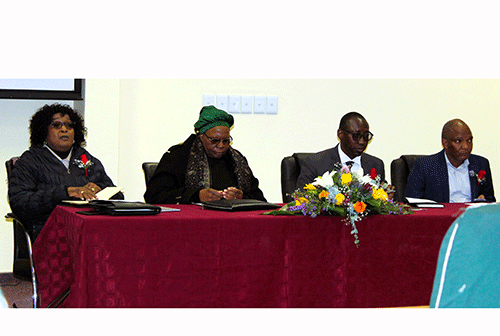Rauna Kalola
Farmers in the Erongo region, including commercial, communal and resettled farmers, met Vice-President Netumbo Nandi-Ndaitwah in Omaruru last week to discuss ongoing challenges.
The scarcity of water, stock theft and vandalism of property continue to hinder their productivity and sustainability.
Many farmers voiced concern over the persistent drought, which has made sustaining livestock increasingly difficult. Over the years, minimal production has been recorded, making it hard for farmers to make ends meet.
Grazing lands have become barren, and the shortage of water makes it difficult for farmers to grow fodder.
Farmers have proposed constructing a water pipeline to serve the entire communal land in Erongo. They also suggest that the government provides vitamin and mineral injection supplements or oral medicine to boost their livestock’s immune systems during the dry season.
Additionally, Farmers are particularly worried by the release of known habitual criminals on bail.
“This is worrisome and discouraging for farmers. Our judicial system must act in the best interests of society at large,” said Klass Uanga, chairperson of the Erongo Regional Farmers Union.
The Vice President emphasised the need for collaboration among stakeholders to achieve successful agriculture, despite the persistent drought and other challenges. “Solidarity in the true sense of African unity must come into play, and we all need to contribute,” said Nandi-Ndaitwah.
She stressed the importance of sharing ideas among farmers, stakeholders, and the central government to address these challenges. Nandi-Ndaitwah also urged farmers to be innovative and research various ways to grow the sector.
“Although water is the greatest agricultural enabler, with the drought being persistent, we cannot remain traditional and keep relying on rain patterns,” she stated.
The proposed desalination plant by NamWater could alleviate the region’s water scarcity, as drilling more boreholes has proven ineffective at times due to drastically dropping water levels in the aquifer.
Other challenges raised include the lack of farm inspections affecting exports, issues with mining and fencing in communal areas, poaching, human-wildlife conflict and poor road infrastructure in rural areas, which causes vehicle damage and increases maintenance costs.
* Rauna Kalola is an information officer for the MICT in the Erongo region


